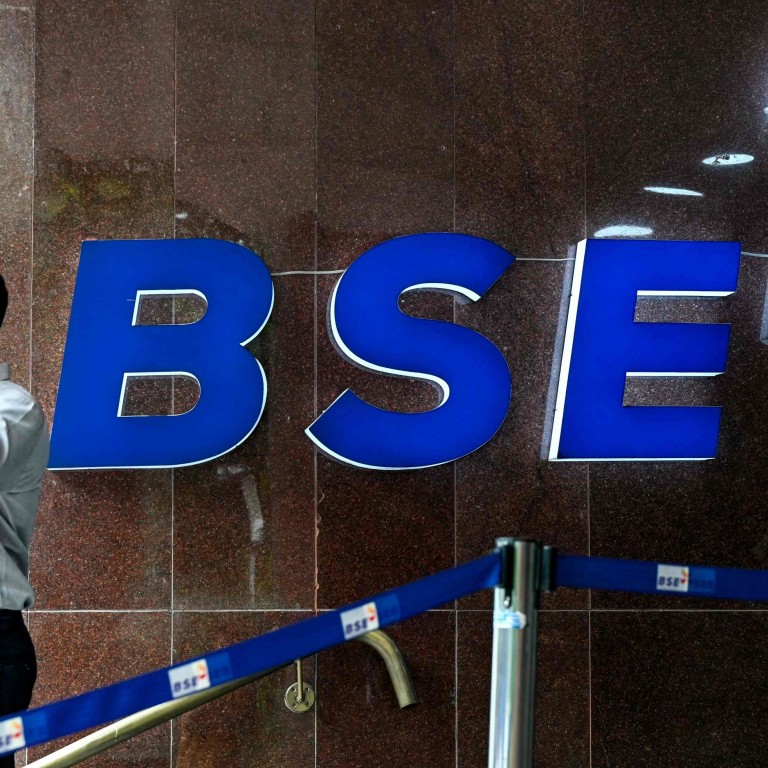
In India, stock market regulator’s alleged links with Adani group sparks political row
- Opposition’s call for parliamentary probe could put government in an awkward position, but analysts say market fallout may be unlikely
A record-breaking run in India’s stock markets that has made it a cynosure of global investors is being overshadowed by a political row over the chief stock market regulator’s alleged links to the controversial Adani business group.
India’s opposition camp is demanding a parliamentary probe, arguing for the protection of small investors. Some observers say the government could be caught in an awkward position if it dismissed such calls, while others note that market sentiment has so far been undented.
The controversy erupted over a report by US-based firm Hindenburg Research earlier this month, accusing Madhabi Puri Buch, chairwoman of the Securities and Exchange Board of India (SEBI), of having links with offshore funds used by the Adani group.
Both Buch and the Adanis have denied any wrongdoing.
Buch has stated that investments in the fund referenced by the Hindenburg report were made with her husband when the couple were private citizens in Singapore in 2015, two years before she joined India’s market regulator.
The regulator has said it has “duly investigated” the Adani group and that Buch has complied with disclosure requirements.
The case carries heavy resonance, as millions of young Indians have flocked to invest in stock markets over the past decade rather than keep their savings in low-yield bank deposits that barely beat inflation.
The country’s benchmark BSE index has risen by 111 per cent over the past five years, breaching several record highs in recent weeks. On Thursday, the index traded close to record highs at 79,105 points.

Congress party leader Rahul Gandhi, who was appointed as opposition chief in late June, used an analogy from the nation’s favourite sport cricket in a video posted on social media X to underscore to people the need for a probe into the Hindenburg saga.
“Imagine you are watching a cricket match, an international cricket match, between India and Australia, and every single person watching the match and those playing the match know that the umpire is compromised. What would happen to the match, what would happen to the fairness of the match?
“This is exactly what is happening in the Indian stock market,” he said.
“The savings of millions of Indians, hard-earned and honestly-earned savings, are at risk. It is therefore imperative that this matter is investigated,” Gandhi said, accusing Prime Minister Narendra Modi’s government of deliberately shying away.
Modi’s government has often been accused of being close to the Adani group, founded by Indian billionaire and one of Asia’s richest tycoons Gautam Adani.
Hindenburg had more than a year ago alleged that the Adani group was involved in stock manipulation and accounting fraud, resulting in steep losses in market value of its stocks, which have now partially recovered amid an ongoing probe by the market regulator.
But the case had been marked by twists and turns.
The regulator, alongside an inquiry into Adani group, had also sent a notice to Hindenburg alleging violations of India’s trading rules. Hindenburg had denied the allegations.

Analysts are divided over whether the latest controversy would spark a fallout in the Modi government and stock market.
The episode is likely to add to the discomfort of the administration, which has looked increasingly defensive ever since the ruling Bharatiya Janata Party lost its outright majority in the April-June national election, according to Nilanjan Mukhopadhyay, an independent political commentator.
“It won’t be easy for the government to shrug it off,” he said, referring to the opposition’s demand for a parliamentary probe. “The government is already feeling its absence of absolute majority.”
Besides a resurgent opposition, Modi would have to satisfy two crucial coalition partners, the Telugu Desam Party in Andhra Pradesh and Janata Dal (United) in Bihar, whose support was critical to government stability, he added.
Mukhopadhyay said the government would find it tough to fend off the demand for a parliamentary investigation. “People will question why you want to protect the SEBI chairman,” he said, adding that a panel could decide whether there was a conflict of interest or not by the chief market stock market regulator.
Undented trading sentiment
While the government might be in a bind over a possible parliamentary probe, analysts say the political controversy over the Hindenburg report is unlikely to impinge on the market’s trading sentiment.
“Hindenburg’s latest allegations don’t have any merit. The best proof of this is the market dismissing these allegations. SEBI’s and the SEBI chief’s response to the allegations have been taken as convincing by the market,” said V. K. Vijayakumar, chief investment strategist at Geojit Financial Services.
Foreign institutional investors are concerned only about relatively high stock market valuations in India due to the enthusiasm of retail market participants, Vijayakumar added.

Harish Ramaswamy, an independent political commentator, said the opposition’s demand for a parliamentary investigation should only be launched once the grounds had been established.
“The one thing with the opposition is that they are not clarifying the details of what really happened. The party that takes these issues seriously must have its own investigation team on what really happened because these are complicated matters,” he said.
A parliamentary probe should only be undertaken if an issue seriously impaired the functioning of the market regulator, whereas the latest controversy involved only one individual wherein nothing had been clearly established, he said.
“The ultimate guardian is parliament, so you can’t go to it for every matter,” he said, adding that the case showed the regulator itself lacked efficiency and transparency.
Ramaswamy pointed out that Congress had also demanded a parliamentary probe when the stock market crashed after predictions of an overwhelming victory for the ruling BJP in June turned out to be incorrect.
“What has happened after that?” he said, adding the matter appeared to have faded out of collective memory.

